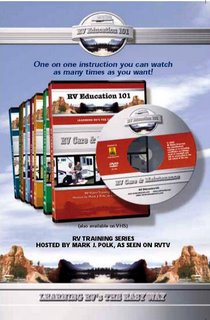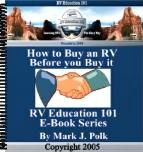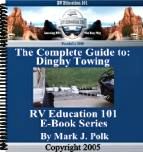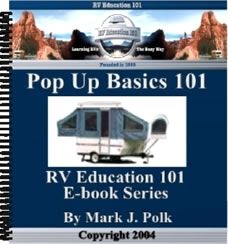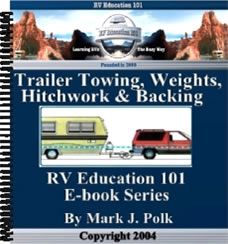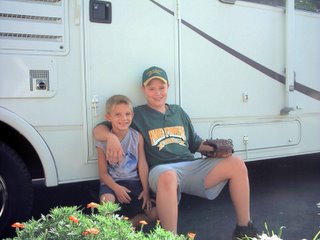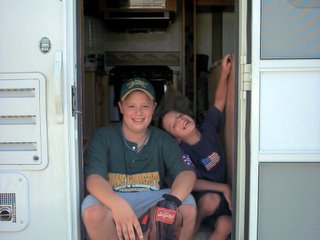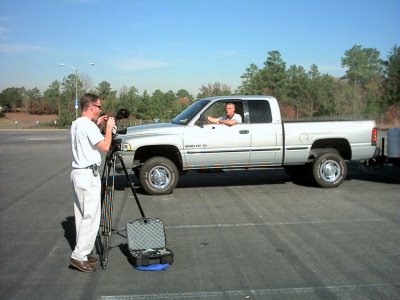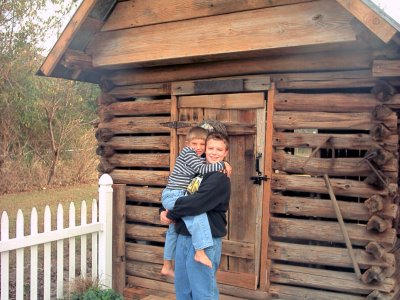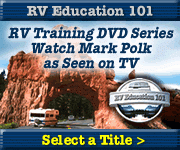De-winterize & Sanitize your RV Water System......By: Mark J. Polk
At the end of your camping season you drained the water system, winterized the RV and put it in storage. One problem with this is that on most RV’s when you drain the fresh water holding tank there is still some water left in the tank. Let’s say you do manage to drain all of the water out of the tank. There is still moisture in the water system. Just imagine what can grow in that moist tank while it sits for three or four months. I’d rather not think about it.
This is the water tank that you drink from and the water you use to wash dishes and take showers with. We cannot assume that it will stay safe and fresh like the water system in our home. Contaminated water is extremely dangerous. We not only have to deal with a water system that hasn’t been used for sometime, but when we travel in the RV we hook our water system up to a different water source every time we stop to spend the night some where. We hook up to city water, well water, and eventually contaminated water. You’ve probably heard people say don’t drink the water if you go to Mexico. Well that can be true anywhere.
There are no guarantees that any water is completely safe for us to drink, but if we take certain precautions we can keep our RV water system safe to use. So where do we start? The first step after winter storage is to de-winterize the RV water system. I took this checklist from my Checklists for RVers E-book to help you with the de-winterizing process.
Depending on how your unit was winterized it will need to be de-winterized. Follow this simple checklist to get your water system ready for this years camping season.
* If you used non-toxic RV antifreeze open all drains and drain the antifreeze from the system into a container. If you do not have a bypass kit on the water heater, drain the antifreeze from the water heater.
* If you put any antifreeze in the fresh water holding tank be sure and drain it.
* Close all of the drains.
* Re-connect the outside shower hose if it was removed.
* To remove antifreeze from the 12-volt water pump, add water to the fresh water holding tank, turn the pump on and open all water faucets. Run water through the system and then turn the pump off.
* Take the water heater out of the bypass mode and hook a hose up to the city water inlet on the RV. Turn the water on and open all water faucets. Run fresh water through the system for several minutes. Don’t forget the outside shower if equipped.
* Flush the toilet.
* Check the entire water system for leaks.
* Fill and drain your black and gray holding tanks at least once.
* Inspect the termination valve and lubricate the valve handles.
* Treat the black tank with holding tank chemicals.
* Re-install any water filter cartridges you removed for winterizing.
What we have accomplished so far was to remove the remnants of RV antifreeze from the water system. Now we need to sanitize the water system so it is safe and ready to use this camping season. This is another excerpt from my Checklists for RVers E-book
Take a quarter cup of house hold bleach for every fifteen gallons of water that your fresh water tank holds. Mix the bleach, with water, into a one-gallon container and pour it into the fresh water holding tank. Fill the fresh water tank almost completely full of water. Turn the water pump on, open all hot and cold faucets and run the water until you smell the bleach at each faucet. Close the faucets. If it’s possible, drive the RV or pull the trailer so the water can move around to assist in cleaning the entire tank. Let it sit for at least 12 hours. Drain the entire system again and re-fill the fresh water tank with potable water. Open all of the faucets and run the water until you no longer smell any bleach. It may be necessary to repeat this process again to eliminate all signs of bleach from the water system.
Now that the RV water system is de-winterized and sanitized here are a couple of other ways to assist you in keeping it safe to use:
Always use a white, non-toxic RV drinking hose. Hoses not labeled safe for drinking can contribute to lead and other dangerous chemicals getting in the water. Use the white non-toxic hose for hooking up to the water source and take along a green or black garden hose for all other uses, like flushing out holding tanks or washing the RV. When you’re not using the drinking hose roll it up and connect the two ends together. This will keep dirt and other debris from getting in the hose. The next time you use the hose, run some fresh water through it before hooking it up to the RV.
Next you need to filter the water going into the RV with a high quality filtration system. Water filters do not purify the water but they can control and remove bacteria, lead and other dangerous contaminants found in drinking water. You basically have two choices on how to filter your RV water system. You can install an inline water filter directly to the water line that you drink from, or you can filter all of the water going into the RV. I prefer to filter all of the water going into the RV. This helps to protect the entire water system and even filters the shower water to help prevent any type of skin irritation.
Follow these simple steps can assure that the fresh water system in your RV truly is fresh.
Happy Camping,
Mark
